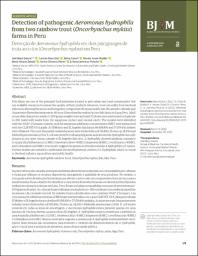“Detection of pathogenic Aeromonas hydrophila from two rainbow trout (Oncorhynchus mykiss) farms in Peru“

Ver/
Descargar
(application/pdf: 1.084Mb)
(application/pdf: 1.084Mb)
Fecha
2022-11-09Autor(es)
Moya-Salazar, Jeel
Díaz, Carmen Rosa
Cañari, Betsy
Badillo, Renato Xavier
Verano-Zelada, Mario
Chicoma-Flores, Karina
Contreras-Pulache, Hans
Metadatos
Mostrar el registro completo del ítemResumen
“Fish farms are one of the principal food industries located in peri-urban and rural communities that
use available resources to ensure the quality of their products. However, trout can suffer from bacterial
infections affecting the sector and being a key component of human health risk. We aimed to identify and
characterize Enterobacteriaceae in 46 trout (Oncorhynchus mykiss) in two fish farms in Lima, Peru. Adult
trouts older than seven weeks (> 200 grams weight) were included. Cultures were performed in duplicate
(n=192 trials) with swabs from the squamous surface and visceral cavity. The isolates were identified
with the Vitek® 2 Compact system, and the minimum inhibitory concentrations (MIC) were interpreted
with the CLSI VET 03-A guide. At El Molino and El Angelito fish farms, 66 (68.8%) and 57 (59.4%) isolates
were obtained. The most frequently isolated species were Escherichia coli (56.8%), Proteus sp. (4.2%) and
Klebsiella pneumoniae (2.6%). E. coli was present in all sampling areas, and Aeromonas hydrophila was only
present in one open viscera sample at El Angelito fish farm. A. hydrophila showed antibiotic resistance
to Ampicillin/Sulbactam (≥32 MIC), Oxytetracycline (>8 MIC), Imipenem (8 MIC), Levofloxacin (>8 MIC),
and Ceftazidime (≥64 MIC). Our results suggest the presence of multi-resistant A. hydrophila in O. mykiss.
Further studies are needed to understand the developmental context of A. hydrophila, which is crucial
to the food industry, aquaculture and public health.“
Colecciones
- SCOPUS [380]

